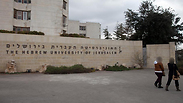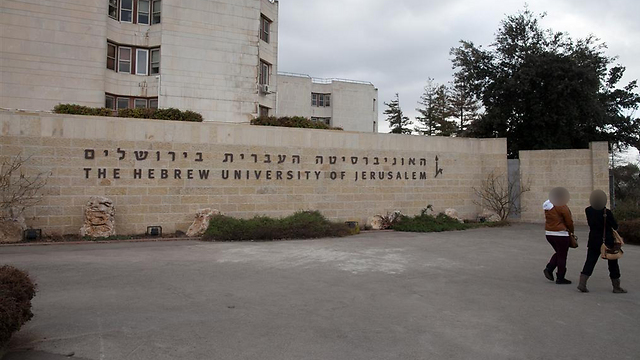

PM scorns Hebrew University for nixing national anthem
Uniting in opposition to the university's decision to drop Hatikva from a Humanities Faculty graduation ceremony, Israeli politicians and ministers dismiss justification of 'consideration' for Arab participants; PM says 'shameful' decision represents the 'height of subservience' that strengthens need for Nationality Bill, while Bennett calls university to remind it is a public institution and a recipient of government finance.
Israel's Hebrew University decision not to play the national anthem at a graduation ceremony has sparked outrage among senior government ministers, prompting Prime Minister Benjamin Netanyahu to release a statement slamming it as "shameful."
The prestigious university said the anthem won't be played at a Humanities Faculty graduation event Thursday "out of consideration" for Arab participants. Netanyahu didn't hold back on his views on the explanation, making no efforts to hide his disdain.
The decision represented “the height of subservience and the opposite of the national pride,” Netanyahu scathed in a recorded statement.
“We are proud of our country, our flag, our national anthem and it only strengthens my (belief) in the passage of the Nationality Bill that we are leading in order to safeguard through law our national symbols that are so precious to us.”
The prime minister was far from alone in his disapproval. Defense Minister Avigdor Lieberman (Yisrael Beytenu) expressed his surprise at the decision. “To cancel the national anthem at the graduating ceremony in the Hebrew University in Jerusalem? As a graduated I was shocked,” he said. “I call on the university heads to change the strange decision.”
The university's "consideration" stems from a sensitivity to the fact that some Arabs may feel excluded by "Hatikva" ("The Hope") because of its emphasis on Jews' historic aspirations for statehood.
But such reasoning struck few emotional chords with Jerusalem Mayor Nir Barkat, who also issued a statement dismissing the university’s sensitivity as grounds for the move, labelling it as an “embarrassment to the wonderful Zionist roots of one of the most important institutions in Israel.” Barkat also called upon the leaders to reconsider its decision “and restore self-respect.”
Hebrew University is a public institution that receives government funding. A similar move last year drew protest from faculty member and students.
Education Minister Naftali Bennett's (Bayit Yehudi) office said he told the university president, Menachem Ben-Sasson that as a public institution, it should respect the state that supports it.
The university rebuffed the criticism, saying there was no legal requirement to play the anthem at academic functions.
Politicians were not the only ones irked by the move, with the university’s own student council expressing opposition.
“The Hatikvah anthem is one of the main symbols of the state of Israel. We see in it a symbolism which gives a national and appropriate depth to the formal ceremonies of the Hebrew University as a public institution in the state of Israel,” the statement began.
“The Hatikvah gives honor to the university and we do not see at as harming any specific people. In addition, as a council we make great efforts regarding proper and respectful integration of all its students. You should be respectful and tolerant towards everyone in an academic institution, but not by forfeiting one of the most important symbols of most of the Israel's civilians.
“We believe that the University should hold its ceremonies along with all the official symbols of the country, as the Hebrew University in the country's capital should. We call to the university to play the Hatikvah tonight, as well as every graduation ceremony it holds.”
(Reuters contributed to this report)

















